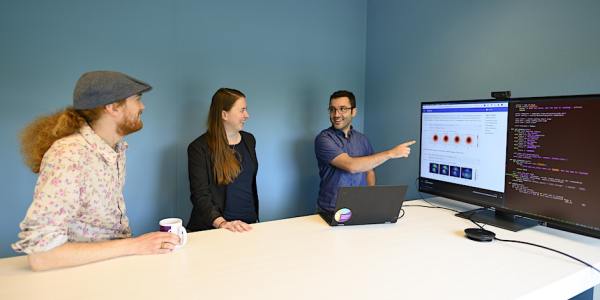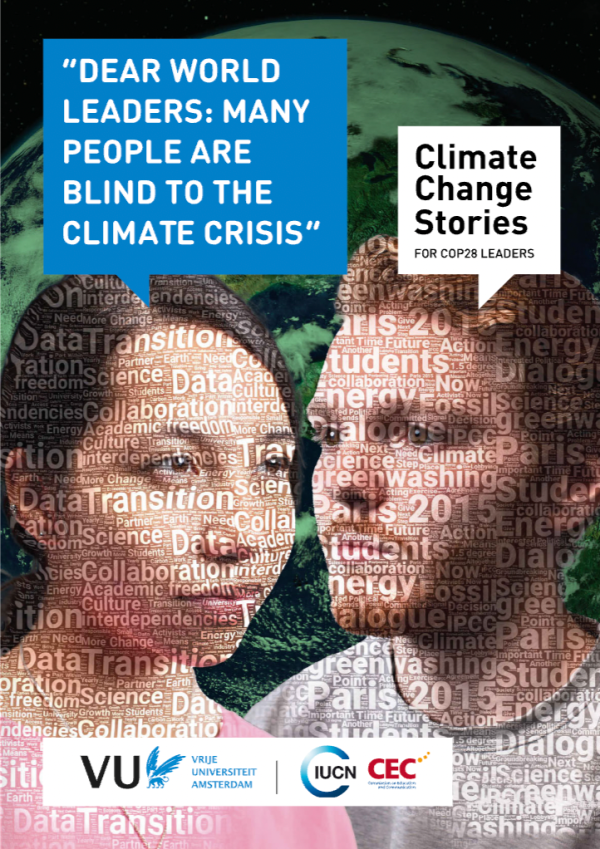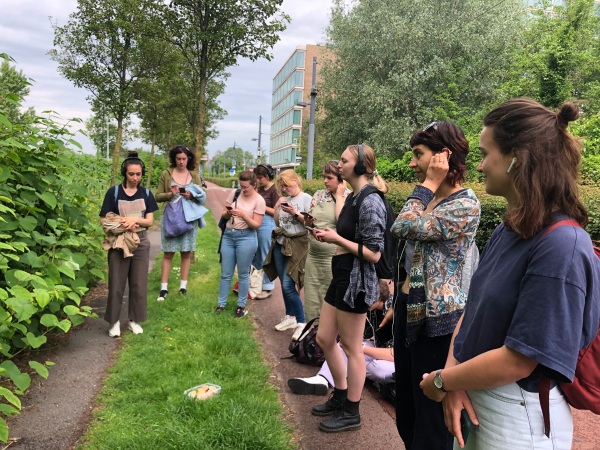Match with your digital research expert: CLUE+ meets the eScience Center Are you working with digital methodologies or would you like to apply digital solutions in your research? Find out what’s possible with experts from the eScience Center! The eScience Center’s Research Software Engineers are specialised in developing high quality digital tools in all academic... Continue Reading →
VU Community Members Participate in COP Storytelling Initiative
EHC board Member Sjoerd Kluiving organised climate storytelling workshops with members of the VU community, and now the results are out! Leaders know that our planet is heating up dangerously. They also know how to cool it down. But they do not do it. So we need a better way to get our message across... Continue Reading →
EHC Environmental Justice Series: Ola Hassanain on Waters. Watching Temporalities
Performance and Panel Discussion (co-sponsored by Greenhouse Stavanger) Monday 11 December, 18.00hrs Vrije Universiteit Amsterdam, Main Building, Church Hall (HG-16A00) Ola Hassanain’s "Tell The Water What The Clay Kept Secret" is ongoing visual research that grapples extensively with the ‘spatial’ implications of catastrophe. The work, conceptualized from an ongoing poetics of ‘space making’ interrogates sculptural abstraction and various ecologies of inhabiting.
Info session on Environmental Humanities Research Master track
On Tuesday 14 November, join the online VU Master's Event to find out more about the track Environmental Humanities in our Research Master programme. Lecturer Kristine Steenbergh and student Sarah Foster will tell you more about the track and answer all your questions in a live Zoom session at 17.30-18.15hrs Amsterdam time.
EHC Environmental Justice Series: Samia Henni on Colonial Toxicity
In the context of her exhibition Performing Colonial Toxicity, which sheds light on the redacted history of French nuclear colonialism in the Algerian Sahara, Samia Henni discusses colonial toxicity and its on-going forms of publicness.
Board Member Dr. Sjoerd Kluiving is VU’s first Distinguished Fellow of the Anthropocene
Dr. Sjoerd Kluiving, EHC founder and board member, is VU’s first Distinguished Fellow of the Anthropocene, which has been set up by the Amsterdam Sustainability Institute in collaboration with the Faculty of Humanities. Kluiving is Associate Professor in Geoarchaeology and Anthropocene Studies and works in the Faculties of Humanities and Science. In the autumn 2023,... Continue Reading →
EHC Lecture Series Environmental Justice: Emily Eliza Scott on Tracking Inequity
In this EHC lecture on 19 September (18.30hrs, VU Amsterdam), Emily Eliza Scott will share from her book-in-progress on art that traces, and thereby actively attempts to resist, various forms of environmental violence as writ into land, air, and water.
“Who Drinks Which Water” wins Poster Prize at ESEH Conference
At the European Society for Environmental History (ESEH) Conference in Bern, The White Horse Press awarded their Poster Prize to the "Coping With Drought" project.
CFP The Aesthetics of Geopower – University of Amsterdam
Call for Papers for "The Aesthetics of Geopower: Imagining Planetary Histories and Hegemonies" at University of Amsterdam in April 2024. Deadline CFP: 15 October 2023.
EHC Lecture: Tracking Inequity with Emily Eliza Scott
We hope you can join us for a lecture with Emily Eliza Scott, Assistant Professor of History of Art and Architecture and Environmental Studies at the University of Oregon. Title: Tracking Inequity: Contemporary Art and Environmental Justice Place: VU Amsterdam Date: September 19 Time: 18:30 More information and registration here.
Job Posting: Post-doc Environmental Humanities of Extraction in Africa
We would like to share the following job opportunity at the University of Groningen. Job description Specialty areas: literary analysis, ethnomusicology, contemporary history, African history, environmental history Applications are invited for a 2.5 years (30 months) postdoctoral research position within the AFREXTRACT project Environmental Histories of Resource Extraction in Africa: Understanding Cultural and Political Responses... Continue Reading →
International Workshop on Rice Cultivation and Culture
We would like to share this opportunity. International Workshop Rice: Cultivation and Culture in Europe and the Mediterranean Venice, Italy 30 May 2023 Università Ca'Foscari Venezia More details are available here: https://pric.unive.it/projects/water-cultures/home
Kathryn Yusoff Lecture: Inhuman Memory
Research Institute CLUE+, the Environmental Humanities Center and the Graduate School of Humanities, in cooperation with the Research Center for Material Culture present Lecture by Kathryn Yusoff (Professor of Inhuman Geography) Inhuman Memory If the earth remembers more than it forgets—as a billion blackened Anthropocenes of colonial earth suggest—what is inhuman memory? Can a gritty... Continue Reading →
Environmental Media Symposium
CLUE+ in collaboration with Waag Futurelab invites you to join an interdisciplinary symposium on sensing practices, environmental media and more-than-human infrastructures on 22 April at Vrije Universiteit Amsterdam.
Hybrid Workshop Learning from Aliens: New Directions in Environmental Humanities Research and Practice
The Environmental Humanities Center Amsterdam would like to share this hybrid workshop organized by the Asia Research Institute, National University of Singapore (NUS). The world’s flora and fauna are often classified as native and non-native, indigenous and alien. These simple binaries mark biological life and, in doing so, define what belongs where and why. But... Continue Reading →














